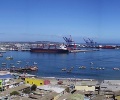
Europe’s worst drought in years has pushed the mighty river Danube to one of its lowest levels in almost a century, exposing the hulks of dozens of explosives-laden German warships sunk during World War Two near Serbia’s river port town of Prahovo.
The vessels were among hundreds scuttled along the Danube by Nazi Germany’s Black Sea fleet in 1944 as they retreated from advancing Soviet forces, and still hamper river traffic during low water levels.
However, this year’s drought – viewed by scientists as a consequence of global warming – has exposed more than 20 hulks on a stretch of the Danube near Prahovo in eastern Serbia, many of which still contain tonnes of ammunition and explosives and pose a danger to shipping.
However, this year’s drought – viewed by scientists as a consequence of global warming – has exposed more than 20 hulks on a stretch of the Danube near Prahovo in eastern Serbia, many of which still contain tonnes of ammunition and explosives and pose a danger to shipping.
Workers in the local fishing industry are also at risk, including from Romania which lies just across the river.
Months of drought and record-high temperatures have snarled river traffic on vital arteries in other parts of Europe, including Germany, Italy and France. In Serbia, the authorities have resorted to dredging to keep navigation lanes on the Danube open. read more
By Prahovo, some of the hulks have narrowed the navigable section on this stretch of the Danube to just 100 metres (330 feet) from 180 metres.
Strewn across the riverbed, some of the ships still boast turrets, command bridges, broken masts and twisted hulls, while others lie mostly submerged under sand banks.
In March, the Serbian government invited a tender for the salvage of the hulks and removal of ammunition and explosives. The cost of the operation was estimated at 29 million euros ($30 million).
Source: Reuters (Reporting by Aleksandar Vasovic; Editing by Raissa Kasolowsky)
Infographic: Low Rhine levels impact commodity deliveries
Infographic: Low Rhine levels impact commodity deliveries
Record low water levels are hindering the transportation of naphtha, LPG, gasoline blending components and diesel, amongst other commodities, along the Rhine into regions of Germany, France and Switzerland leading to critically low inland stocks and the release of strategic reserves for products already affected by the war in Ukraine and a rebound in transportation demand.
In this episode of the Oil Markets Podcast, S&P Global Platts Global editors Eklavya Gupte, Virginie Malicier and Vinicius Maffei discuss with Gary Clark the market implications of strained supply chains for clean oil products for Europe.
Source: Platts

